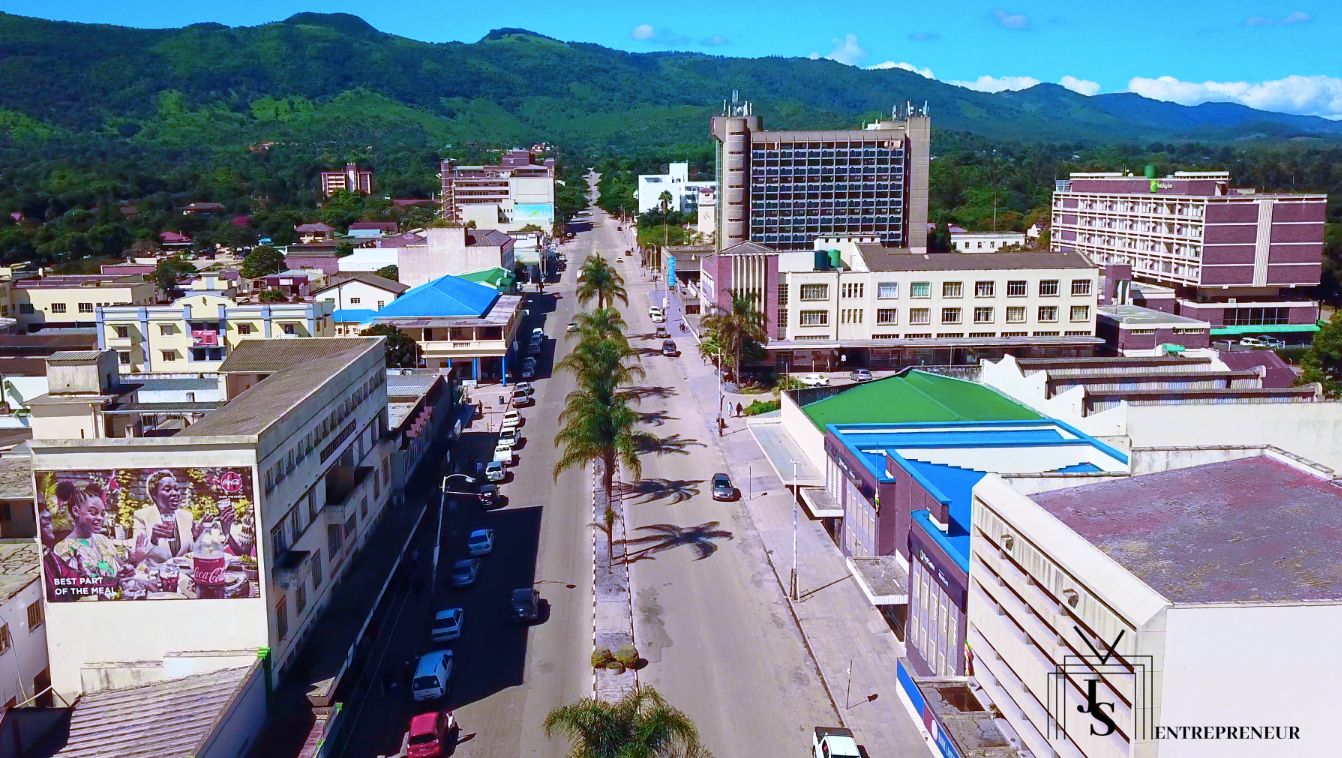
City of Mutare beautification programme eyes to return sparkle to the eastern jewel
June 24, 2020
City of Mutare clarifies new tariffs, water woes fallacies
June 30, 2020International haulage trucks road levy expected to be operational in July: City of Mutare

Haulage trucks using the Beria Corridor queue on the Mozambican border side waiting to be cleared to enter Zimbabwe through Forbes Border Post in Mutare.
…IDBZ interested in Feruka Bypass Road project
Ngoni Dapira
THE proposed levy for all international and locally based international bound haulage trucks in transit through Mutare is expected to be operational by end of July, City of Mutare finance director Blessing Kapuya has said.
In March, in accordance with the Urban Council Act, the Minister of Local Government, Public Works and National Housing, July Moyo, approved the supplementary budget proposal submitted by the City of Mutare in August last year. The local authority came up with a supplementary budget to raise its preliminary 2019 budget of $31.1 million to $36.4 million (RTGS). Among the various tariff measures proposed to try help the ailing local authority recover costs to meet service delivery targets was the road levy for all 30-tonne trucks in transit through the eastern border city.
At first the proposal was that local truckers would pay $30 and foreign truckers $50, Kapuya said this has been reviewed after the current stakeholder consultations they have been doing and the new tariffs are expected to be availed by July 1. Currently the local authority charges $24 road levy tariffs for industrial and commercial properties and $9 (changed from $1.80 in March) for residential suburbs but the local authority says this is not enough. He said the increase in transit trucks that now use the Beira corridor as the quickest gateway to the sea has worsened the state of the city’s road which is why the road levy for transit haulage trucks was proposed.
“The road tariffs on households and commercial properties can’t even procure 10 drums of bitumen per month, given that a drum currently costs about $50 000 (RTGS). That is why we started exploring coming up with an extra road levy for international and transit haulage truckers. We have engaged all stakeholders and the bylaw is now in its finality. By 1 July we should have come up with new tariffs for that,” said Kapuya.
City of Mutare town clerk Joshua Maligwa also bemoaned the state of the roads due to the haulage trucks and said the levy on transit trucks was the only solution to ensure the roads used by the trucks are resurfaced and constantly maintained.
“The roads used by transit international haulage trucks to and from Mozambique are in a shocking state, so this levy will help us resurface and maintain the standards of the roads and other major roads in our city, which is the gateway to the sea. Glasgow Road and Park Road are now an eyesore due to the haulage trucks and the international truckers need to pay something, which is why the levy was proposed,” said Maligwa.
The local authority also gets money annually from Zimbabwe National Roads Administration (ZINARA) for road maintenance. Last year Mutare Mayor Blessing Tandi told this publication that the local authority was supposed to get about US$2.3 million for its road fund from ZINARA, but the money was coming in dribs and drabs, which was not workable for effective service delivery on roads rehabilitation projects.
“From the ZINARA road fund in May we got $300 000, in June $400 000, then I think we got more money in August, but the bottom line is this fund is supposed to come once-off, so that we can meet our annual budget plans against a nail biting inflation rate. So the dribs and drabs become unmanageable, but hopefully our road levy from haulage trucks will supplement the ZINARA road fund and ensure consistent revenue to repair our road infrastructure which is in a bad state, especially given our standing as the tourist capital of the eastern highlands tourism bloc,” he said
Transport and Infrastructure Development Minister Biggie Matiza was early last year grilled over claims that ZINARA was not availing financial resources for road rehabilitation to local authorities in time. Appearing before the Parliamentary Portfolio Committee on Transport and Infrastructure Development, Minister Matiza admitted that ZINARA was not availing funds on time to local authorities for road rehabilitation programmes.
ZINARA which was established in 2002 is mandated to fix, collect, disburse road user charges and mobilise revenue for roads development and maintenance. Its role also encompasses the monitoring of such funds that would have been disbursed for road maintenance to road authorities. However, a recent audit revealed massive corruption at ZINARA where prominent politicians were implicated. For a long time now, most local authorities have been clamouring to retain the responsibility of collecting vehicle licence fees as a replacement of ZINARA. Vehicle licence fees were collected by local authorities (Rural District Councils and Urban Councils) until in 2009 when government decided that ZINARA takes over collection then disburse funds to local authorities.
Mutare is strategic for the realization of the Beira corridor. This is one of Southern Africa’s main transport routes that links Zambia, Zimbabwe, Malawi, Democratic Republic of Congo (DRC) and Mozambique to the port of Beira on the Indian Ocean by both road and rail networks.
Mutare Dry Port general manager Lawrence Takawira in an interview last year said they clear about 300 to 350 haulage trucks a day. The container-handling firm with storage and dry port facilities on rail and road served land, offers import and export agency services on behalf of its clients around the country. Calculating the number of trucks cleared daily this could be translated to millions of dollars collected annually to supplement the existing road levy on commercial and residential properties.
Takawira said the Beira corridor has in the past years received little limelight but is fast becoming considered as an alternative to South Africa’s Durban port and Tanzania’s Dar es Salaam port for shippers who need a fast, cost effective and no headaches logistics solutions to avoid congestion and escalating costs. Mutare is strategically placed as it is less than 300km away from Beira compared to Durban which is over 1500km away and Dar es Salaam which is over 2000km away from Harare.
“People’s perception of Beira is still based on operational realities of 15 or more years ago. After dredging the channel and huge infrastructural investments, Beira must be considered as an alternative to Durban and Dar es Salaam. Principal exports passing through Beira are ores, tobacco, food products, cotton, and hides and skins. The main imports are liquid fuels, fertilizers, wheat, heavy equipment, textiles and beverages,” said Takawira.
At the moment local haulage truckers in transit from outside the country pay $20 (RTGS) for road access at the border then $50 (RTGS) at each tollgate. For the foreign truckers in transit, they pay the Zimbabwe Revenue Authority Horse insurance of US$50, trailer insurance of US$10 per trailer and carbon tax of US$10. They also pay for a tollgate fee coupon which is calculated according to their destination within the country. This coupon will give them access to pass through tollgates without restrictions. So the road levy being prosed by the City of Mutare on transit local and foreign truckers will add to those statutory charges.
During the 52nd Session of the Economic Commission for Africa Conference of African Ministers of Finance, Planning and Economic Development held in March last year, the member States, Zimbabwe included, were asked to look into the structural challenges faced by landlocked developing countries in trade. It was agreed that the structural challenges will be addressed through six mutually reinforcing priority areas namely—fundamental transit policies, infrastructure development and maintenance, international trade and trade facilitation, regional integration and cooperation, structural economic transformation and means of implementation.
The other major proposals that were approved in the supplementary budget were the 800 percent tariff increment on all commercial, industrial and institutional areas, 500 percent increment on all billiables outside local government authorities, all land debtors outstanding balances were increased by 500 percent for all serviced areas, health fees were increased by 200 percent, parking and clamping fees were also increased.
Quizzed on progress regarding the Feruka Bypass Road, Maligwa said they had found a potential financier the Infrastructure Development Bank (IDBZ) which has place the project under its 10 key projects.
The Feruka Bypass Road was long-since designed to decongest traffic that use the Christmas Pass route in and out of the city, especially haulage trucks. The Feruka Bypass route goes round through the Feruka Road past Weirmouth and ARDA Transau then links with the Mutare-Harare highway at Odzi. The road was also designed to be easier for heavy vehicles that year in year out have been the cause of many accidents on the steep Christmas Pass road.
“It is a 10 key project which will be funded in conjunction with the Ministry of Transport and Infrastructural Development and the Government of Zimbabwe. At the moment we have found an interested financier, IDBZ,” said the town clerk.


